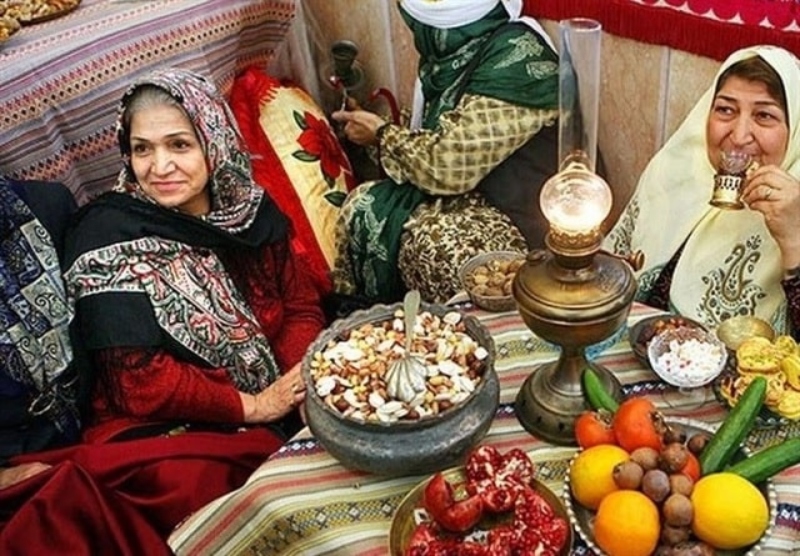Yalda night is the longest night of the year with old stories in different cultures of Iran that brings families together with a celebration of colors and flavors.
Yalda night, as the longest night of the year, is a festival of colors, flavors and old stories in different cultures of Iran. This night is an excuse to gather families, review memories and keep traditions alive that each region of Iran has decorated with its own beauty and cooking Yalda night dishes.
From symbolic foods to storytelling, poetry reading and local games, Yalda tells the story of unity in diversity. Where people, with their rituals and beliefs, turn the longest night of the year into a passionate and memorable night, and each culture, with its unique color and scent, links this night to the celebration of the sun’s birthday and the promise of brighter days.
Yalda night customs in different cultures of Iran:
East Azerbaijan
The Turkic-speaking people of East Azerbaijan have special and attractive customs on Yalda night and they have preserved this ancient tradition for a long time. One of the customs of the people of this region on Yalda night is the ceremony of eating watermelon, which is called “Chile Qarpizi” among the people of Azerbaijan. In this ceremony, the first blow to the watermelon is given by the eldest member of the family by saying “Qada Belamizi Bo Geje Kesdukh” or “We have cut our troubles today”. Azerbaijanis believe that by eating watermelon on this night, they will not feel the burning cold until the end of the year.
Photo source: blog.okcs.com. Photographer: Unknown
On this night, newlyweds in Azerbaijan also receive gifts called “Khuvanche” from the groom’s family. In this ceremony, a decorated watermelon is taken to the bride’s house along with a red shawl and a gift; Of course, in the city of “Khoi” they also send wool along with gifts. In the first year of marriage, the bride’s father sends watermelon, fruit, nuts, sweets, a shirt, shoes and a veil to his daughter’s house. The traditional food of Yalda night in East Azerbaijan includes rice, chicken and milk soup.
West Azerbaijan
Yalda night in West Azerbaijan is accompanied by a special ceremony known as “Khadr Nabi”. In Khadr Nabi ceremony, lucky young people gather beans and cook them. After that, the cooked beans are pounded in a mortar with salt. Each of them puts seven fingernails of pounded beans under his tongue and goes to sleep to explain what he has seen in his dream to elders and elders and to be interpreted by them. The lucky girls also cook Nazri Ash with part of the collected beans to improve their luck on Yalda night; Of course, in West Azarbaijan, Chileh Qarpizi ceremony is held with the same shape and appearance of East Azarbaijan province.
Khashil, which is prepared using wholemeal flour, cinnamon, butter and sugar, is one of the most famous local dishes of Yalda night in Azerbaijan. The people of Azerbaijan region believe that eating Khashil on the longest night of the year, like a strong elixir, makes their body resistant to cold. To serve Khashil, pour it in a bowl and add milk and honey to make it sweet and nutritious.
Guilan
The people of Gilan have different beliefs about Yalda night. Some people believe that at an undetermined moment of this blessed night, all the waters of the world will freeze at the same time, and at that moment, people’s wishes will be fulfilled; But what is common among all the people of Gilan is eating watermelons that they had kept in rice stalks woven from the summer for Shabbat Chele; Even some people from the east of Gilan sing their own local poetry while slicing watermelon.
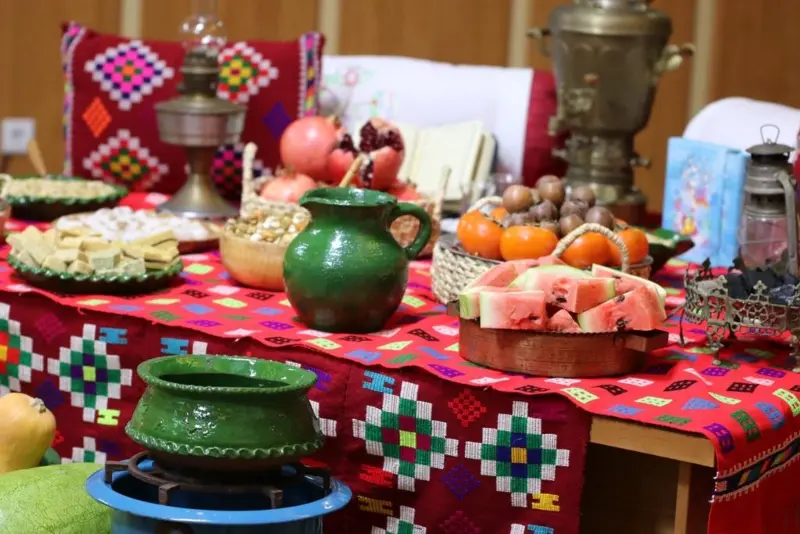
Photo source: mojnews.com. Photographer: Unknown
One of the common foods of Yalda night in Gilan is “Aukonus” (conus water). This food is actually parsnip fruit, which is kept in a vat of water and salt in the warm air of the room for such a night. On this night, the younger people take the watermelon peel, known as “Handane Poos”. The method of fortune-telling is also that they cut the watermelon skin lengthwise into four pieces and throw it behind their heads. Watermelon skin may fall from the green or white side. The higher the number of greens, the better the result. Not to mention, in Gilan province, during a ceremony called “Shab Chelegar”, the bridegroom sends a plate decorated with fruit, food and snacks for Shab Chele, in the middle of which is a large raw and fresh white fish, decorated with vegetables. is
Ardabil
Yalda night in Ardabil is known as “Chile Geje Si”. This night is a symbol of peace, mercy, kindness and intimacy. The people of Ardabil divide winter into three parts of 40, 20 and 30 days. The first 40 days are called Big Chaleh, the next 20 days are called Small Chaleh, and the last 30 days are called “Bayram Ayi” or the month of Eid. The night of Yalda in Ardabil coincides with the beginning of the big chela, and they swear to the big chela not to be too hard, and in this way they start their winter season.
Yalda night in Ardabil starts with eating watermelon, pomegranate, and sweets. Children also enjoy eating roasted wheat (qorqa), walnut kernels, chickpeas, and raisins, and they play “Goll Ya Pooch” with their elders until late at night.
Hamadan
Yalda night is of special importance in Hamedan. The women of Hamadani welcome such a night by tying grapes and preparing snacks and nuts in advance and prepare the ground for family gatherings. Among Yalda night snacks in this region, we can mention such things as green raisins, grapes, pomegranates, dried figs, hemp, dried berries, wheat, watermelon seeds and roasted melon, chickpeas, walnuts, almonds, nettles, raisins and sandalwood.
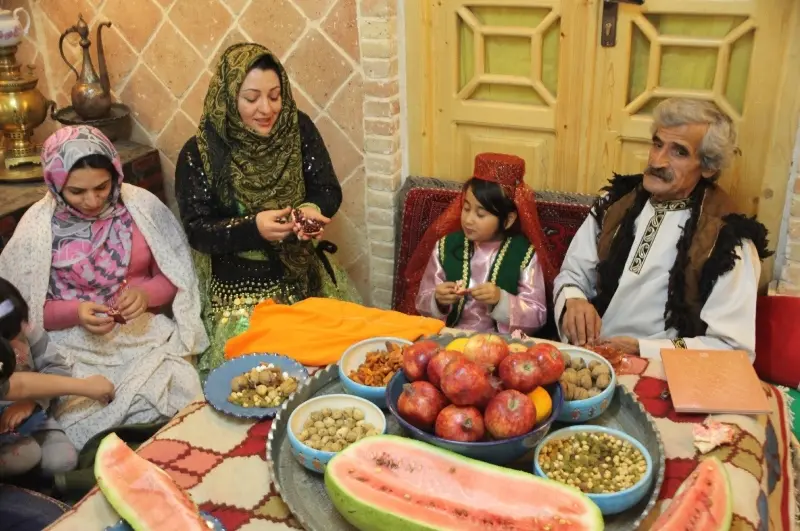
Photo source: chtn.ir site. Photographer: Unknown
One of the other customs of the Yalda night in Hamadan is to take a fortune teller. To get this fortune, everyone sits around the room and one of the old women of the assembly starts reading a poem. After finishing each poem, a little girl puts a needle on a piece of cloth that has not been cut and has not seen water, and the guests consider the poems as their omens. In the city of Ajin, the bridegroom’s family takes fruits and snacks to the newlyweds.
Mazandaran
Yalda night in Mazandaran province is known as “Cheleshu” ceremony and its importance is so great that they believe that if a family does not prepare for this night, it will suffer bad omen. The people of this country prepare themselves for this night with housewarming several days in advance, and if they have a Russian style, everything that is needed for the night of the night, in addition to fish and chicken as “expenditure”, after the sunset of the night of the night, from the groom’s side. They send it to the bride’s house.
One of the most attractive activities of Yalda night among the people of Mazandaran is fortune telling with walnuts. In this way, people with closed eyes take some walnuts and hide them under their mattress. Tomorrow morning they break those walnuts and if the kernels of the walnuts are white, their intention will be fulfilled.
Khorasan
Yalda night is very similar in all three provinces of South Khorasan, Razavi and North Khorasan. On this night, Khorasanis gather together and make it more memorable by eating snacks and reciting Hafez and Shahnameh. One of the special occasions of Yalda night in this region, especially in South Khorasan province, is the clapping ceremony.
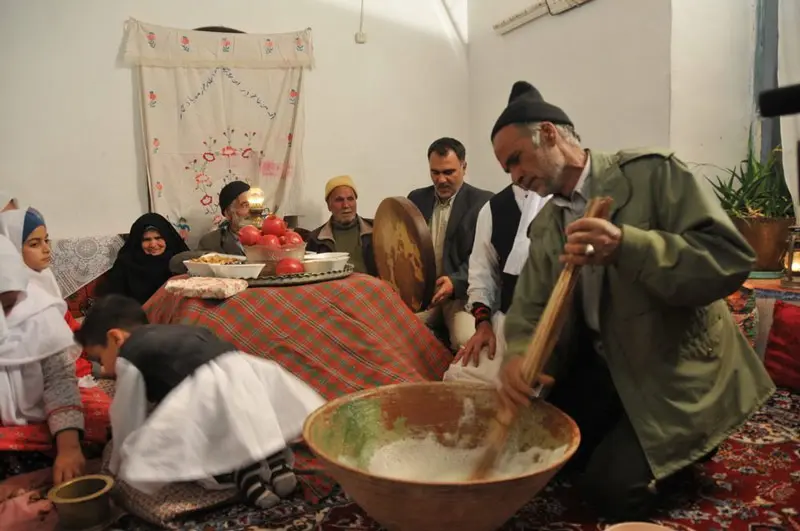
Photo source: mehrnews.com. Photographer: Unknown
In the palming ceremony, the root of a plant called “Chobek” or “Bikh” is soaked in water and after boiling several times, in a large clay pot, with a bunch of thin pomegranate tree sticks called “Daste Gaz”, in cold weather. They beat it until it becomes frothy. The prepared foam is mixed with sugar syrup and then it is decorated with walnuts and pistachios for serving. Another ceremony of Yalda night in Khorasan province is carrying a tray decorated with fruits, nuts and sugar cubes to the house of Novarosan. In case of snowfall, the people of this region eat some snow with juice to reconcile with the coldness of winter.
Golestan
Yalda night in Golestan province has a special purity and intimacy; Because the families gather together under a chair and the elders of the group begin to tell less heard stories and do the so-called narrating.
Yalda night foods in Golestan province include special and delicious fruits such as oranges, lemons, “velik” and “candes” and make the night more memorable by eating sweets such as “kasmak” (a type of milk candy).
Isfahan
Isfahanis believe in two chelas, known as “Big chela” (from 1st of December to 10th of Bahman) and “Small chelah” (from 10th of Bahman to the end of Bahman). The Yalda night ceremony in Isfahan is held as a family and by spreading a table of colorful foods. The foods of Yalda night in Isfahan, which is called “chalsame”, include nuts, wheat and hemp, and among the common foods of this night, we can mention local dishes such as kofte and “gundi”.
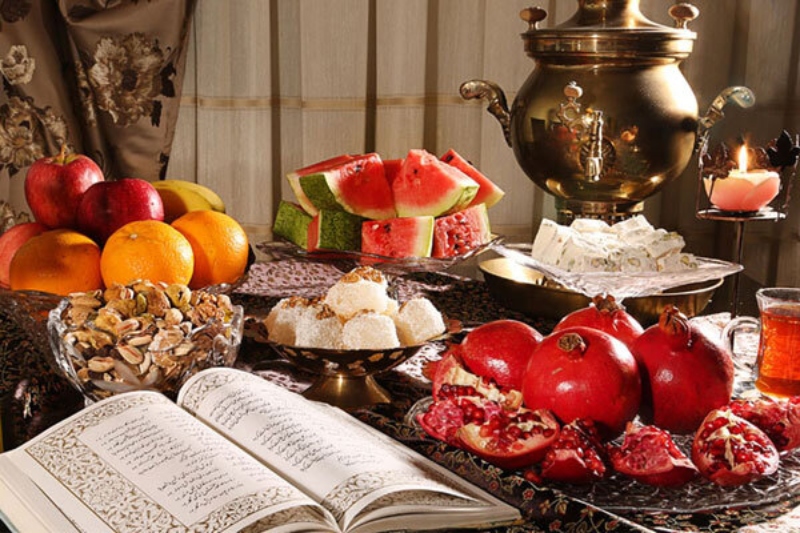
Photo source: hamshahrionline.ir site. Photographer: Unknown
In Isfahan, they spread their clothes and beds in the open air and in front of the sun for “Cele Bozoreh” which starts from the beginning of January and lasts until the 10th of Bahman. “Chele Kochche” also starts on the 10th of Bahman, and on this occasion they organize a festival called “Kezhi” or “Badrouz” which lasts for a week.
Tehran
Like other Iranian cities, Tehranis try to celebrate Yalda night as beautifully and attractively as possible and consider this night as a symbol of blessing, health and happiness. In Tehran, all the family members gather in the big family house, they set a table of nuts, watermelons and colorful fruits and eat together. It is also very common to eat dry fruit on this night. Tehrani’s Yalda night dinner is usually Tehrani pomegranate soup, Kalamkar shell soup and pomegranate and eggplant stew.
The people of Tehran usually take fal Gardu and fal Hafez on Yalda night, and by telling beautiful stories from the past and reading Hafez and Shahnameh, they make this period sweeter and more memorable.
Kurdistan
Yalda night in Kurdistan, which is known as “Shehu Zestan” or “Shehu Chele”, is associated with special customs. On this night, all the family members gather in the big house of the family and in addition to eating dolmeh and sangak bread and various fruits of the season, sour melon or as the Kurds call it, “sour melon” which they had prepared since summer for such a night, is served to their Yalda table. They add In Kurdistan, according to the customs of other Iranian cities, the bridegroom’s family brings a Shabbat for their bride, which includes winter clothes, cloth, gold, fruit, sweets, dalme, halva, nuts, and chocolate, decorated with red cloth and a clay jar.
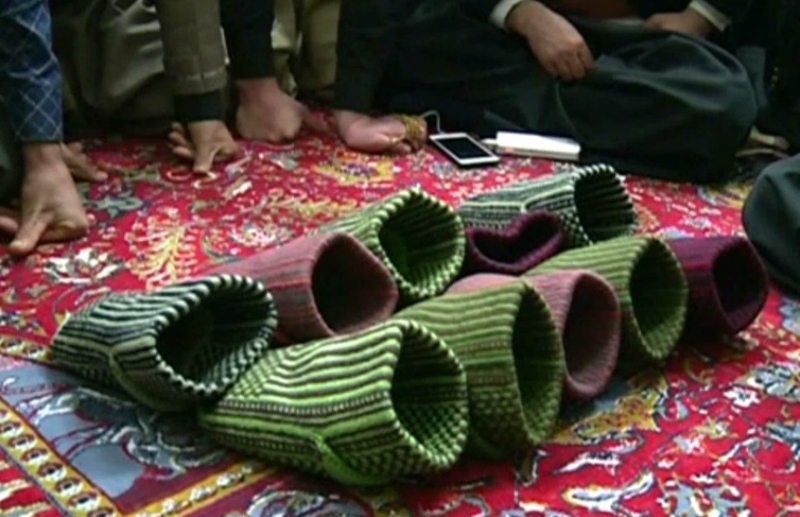
Photo source: iribnews.ir website. Photographer: Unknown
After dinner, the Kurdistanis play the game of “Gorwa Bazi” or “Sock Game” and spend the longest night of the year happily by listening to the stories and stories of the elders. The sock game in Kurdistan is that two groups spread their socks and one of them hides a coin under one of the socks. The second group must guess the location of the coin. If the coin under the first sock is “goal”, 15 points are scored in favor of the rival team and the turn of the game is changed. If not found, the opposite group must remove the socks to reach the last two socks. If the coin under the second sock is “for” or found first, the player is awarded a point. The score limit is also determined before the game.
Chaharmahal and Bakhtiari
Yalda night in Chaharmahal Bakhtiari is a traditional celebration that is held by the family gathering in the house of the elders and under the chair, and on this night they eat foods such as watermelon, pomegranate, raisins, walnuts and local snacks that have been prepared since summer. Hafez fortune-telling, Shahnameh reading, Masnavi reading and Hafez reading are the main customs of this night that elders do to create happiness in the family.
In Chaharmahal and Bakhtiari, Yalda night is associated with special rituals such as boiling pumpkin and cooking ash kashk. They also bake a bread called Garde with a blue bead for this night and share it among the family. Whoever has a blue bead in a piece of bread is known as the lucky person in the family.
Kermanshah
Yalda night in Kermanshah is associated with special and original customs of this country. On this night, families gather around the chair and spend the night eating local foods such as cooked pumpkin, walnuts, raisins, watermelon, Rahat al-Halgom, problem-solving nuts, local sweets such as kak, rice bread, and paneer bread.
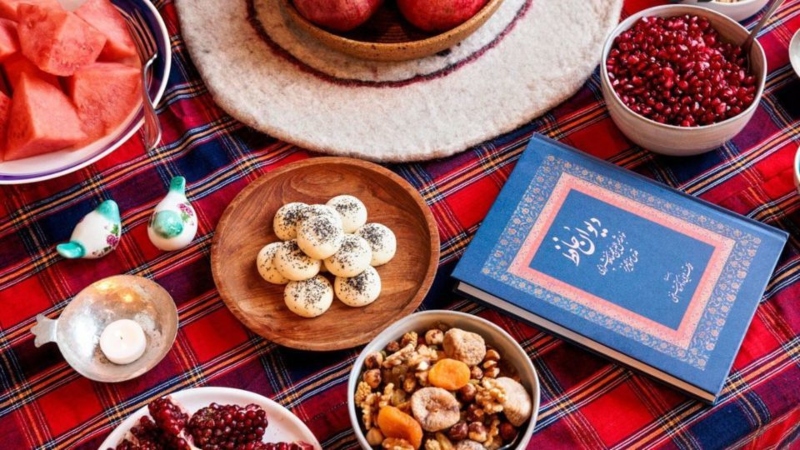
Photo source: alef.ir site. Photographer: Unknown
Playing Gol Ya Poch, fortune telling with Divan Hafez and reading stories from Shirin and Farhad, Rostam and Sohrab and old poems in Shirin Kurdish dialect are the inseparable rituals of this night.
Lorestan
In Lorestan, Yalda night is called “show first continent”. In this night, the younger people go to the roof and sing poetry by hanging a shawl or a tent from the roof. Neighbors also put nuts, sweets, roasted wheat, cannabis and fruits in their tents to thank the children.
You can enjoy delicious foods known as “Gandam Shire” on Yalda night in Lorestan. To prepare wheat juice, wheat is first soaked in juice and turmeric and salt are added to it. Then it is roasted on “teak” and decorated with almonds, walnuts, raisins, black seeds and sesame.
Kerman
In Kerman, Yalda night is celebrated by gathering families in the elders’ house. A table full of fruits such as watermelon, pomegranate, nuts and local sweets such as “Kamach” and “Klumpe” is set. Ceremonies such as reciting Hafez, fortune telling and games such as “Snake” are among the entertainments of this night.
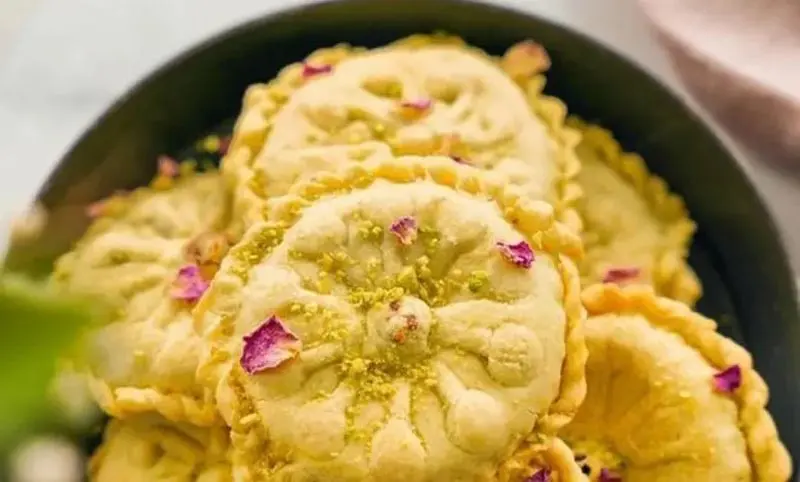
Photo source: banuzi.com. Photographer: Unknown
From the point of view of the Zoroastrians of Kerman, the Yalda night is a symbol of the domination of the devil and darkness due to its long duration, and for this reason they stay awake until dawn. Legends about the presence of “Qaroon” in the form of a firewood breaker on this night are also among the old beliefs of this region.
Fars
On Yalda night, Shirazis prepare cool foods such as watermelon for warm-tempered ones and warm foods such as figs and dates for cold-tempered ones. The special dish of this evening is Shirazi cabbage and carrot pilaf. Among the other customs of Fars province on Yalda night, we can mention sacrificing in Kazeroon, making vegetable haftakham in Fasa, cooking milk rice in Maroodasht, cooking “Kamach” (a kind of sweet) in Darab, and cooking Ash Dogh in Firozabad.
One of the special traditions of Shirazis on Yalda night is “Fal Kaluk”. In this custom, which is more common among women, a glazed jar (kluk) is brought to the crowd and each woman puts a sign in it; A little girl then pulls out a sign and a literate woman interprets it with poetry and song. In this ceremony, the reading of Hafez’s poems and local songs play a prominent role.
Yazd
Yalda night in Yazd is a fascinating combination of ancient Iranian traditions and Islamic teachings, which is celebrated with special rituals. In some neighborhoods of Yazd, in addition to reciting Hafez and telling interesting stories, such as the Wednesday ceremony, bonfires are also performed to keep authentic Iranian traditions alive along with family gatherings.
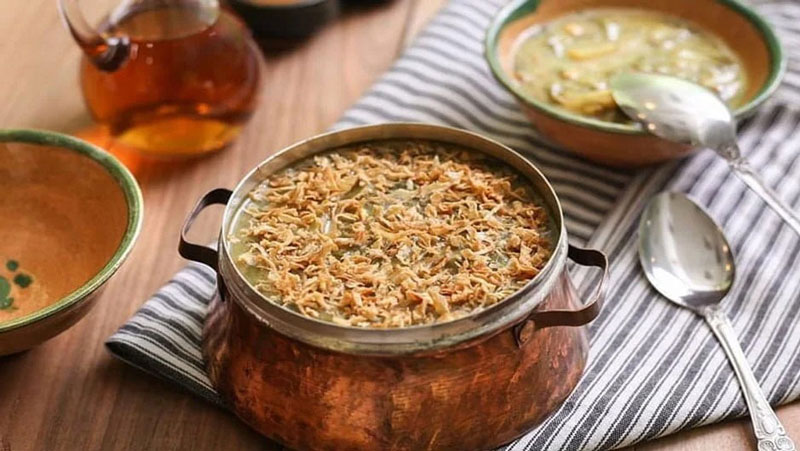
Photo source: kalleh.com. Photographer: Unknown
Among the famous dishes of Yalda night in Yazd are “Ash Shuli” and Fasanjan. Pomegranates, watermelons, parsnips, beets, oranges, tangerines, persimmons, and all kinds of nuts and dried fruits, apricot leaves, peaches, chickpeas, and raisins also stand out in Yazd’s Yalda night tables.
Semnan
Yalda night is celebrated in Semnan province with various customs and traditions and it has a special color and smell in each region. Shahnameh reading, Tafal to Hafez and playing reeds along with local songs are among the entertainments of this night, which are mainly done by the elders of the family. In villages such as “Aftar” and “Badle Kouh”, these rituals are followed with special importance and even this night is known as “Shabullah”.
One of the other special customs of chelehsin in Semnan is to eat various snacks and local foods such as techin esfanaj and fasanjan, and in some villages, the ceremony of “chelechushi” is also held. In the slaughtering ceremony, the herdsmen sacrifice a sheep and store its meat for the winter. The desert dwellers of Shahroud and other parts of Semnan consider it obligatory to eat watermelon, and local games, storytelling and reciting poems are popular in family gatherings. If the snowfall also doubles the beauty of Yalda night, traditions such as eating a mixture of snow and sap accompanied by reciting instructive stories are among the most attractive parts of this night in Semnan.
Qom
Yalda night in Qom, like other regions of Iran, is celebrated with special customs and traditions and is rooted in ancient traditions. Families prepare snacks such as pomegranates, nuts, shavings, pashmak and seasonal fruits weeks in advance. A night out, conversation, tafal to Hafez and narration of old legends are among the common programs of this night. Also, if a girl is newly married or engaged, the groom’s or bride’s family take gifts such as nuts and sweets to each other’s house.
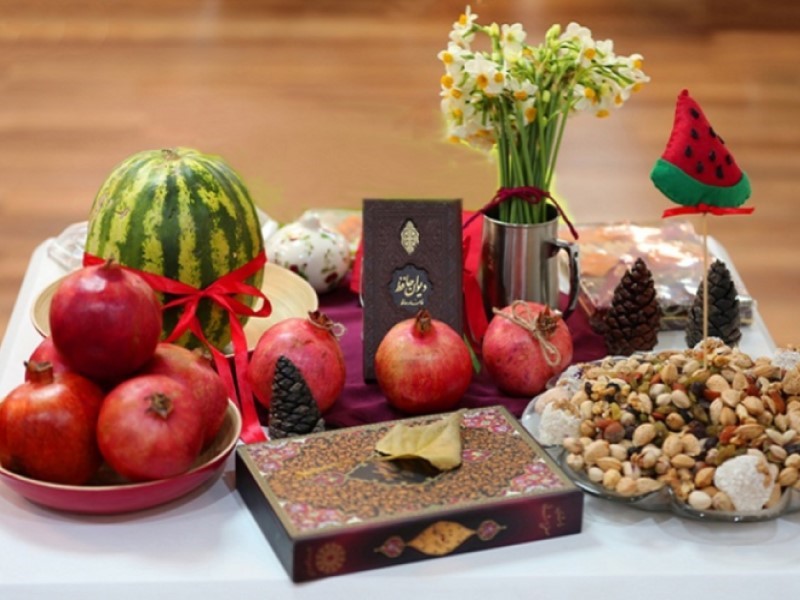
Photo source: baghviolin.com. Photographer: Unknown
Among other old customs of Qom, we can mention “spoon-making” and “shawl-making”, which of course were more popular in the past. In these rituals, children doubled the happiness of this night by taking snacks from the houses.
Sistan and Baluchistan
In Sistan and Baluchistan, Cheleh night is celebrated as the longest night of the year and a symbol of the rebirth of the sun, with the gathering of families in the house of the elders of the family. In Balochi culture, we have two chelas from December 15 for 40 days and nights and from early February to March 15.
“Seto”, “Shirink”, “Doshu”, seeds and watermelons stored in straw are also special foods of this night. A delicious winter dish, Doshu (Doshab), is prepared from the combination of Mozafti good dates and yellow animal oil.
Hormozgan
People of Hormozgan, like other parts of Iran, celebrate Yalda night with family gathering, eating local snacks such as “Ksudang”, “Gun”, roasted sesame and various fruits. Elders telling stories with “chichka” (legendary stories) and reading Hafez and Saadi’s poems are other customs of this night. Also, local breads such as “Regag” and “Silk” along with dishes such as fish roe and roasted fish have a special place in the Yalda table of Hormozgan people.
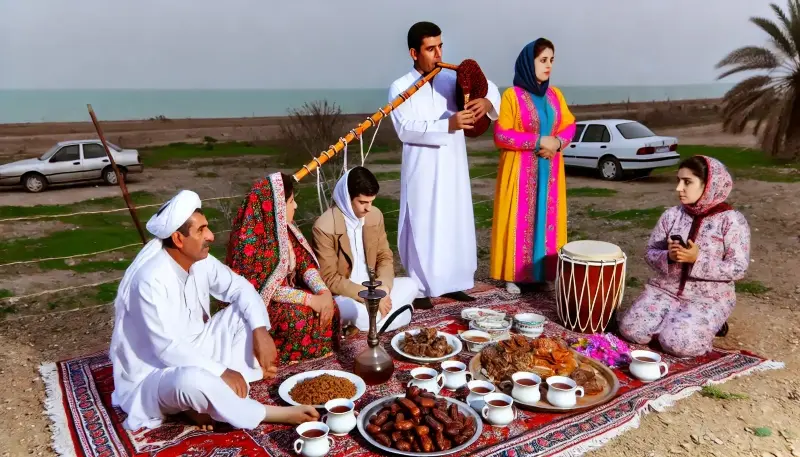
Photo source: kojabama.com. Photographer: Unknown
This night is celebrated with joy and foot stomping along with local instruments and dahl. By praying for the welfare of the younger ones, the elders add a special warmth to this ceremony and turn Yalda into a pleasant and traditional memory.
Alborz
Families in the villages of Alborz province, especially Taleghan and Asara, gather on Yalda night and enjoy traditional rituals such as poetry reading and story telling. Yalda’s night table includes various snacks such as wheat, buckwheat, roasted chickpeas, almonds, pistachios and various dried fruits such as elderberries, raisins and fruit leaves. Also, light foods such as dry leaves of fruits and nuts are also placed next to these tables.
The Yalda night ceremony in Taleghan begins with sitting around the chair and praying for the blessing of the next year’s harvest. Among the special rituals of this night in Taleghan, we can mention “Darji Saran” and “Shawling” in which young people send a bag down through a hole in the roof and the members of the house fill it with snacks. On this night, local games such as “Angshetar Bazi” and “Ghadre Bazi” are played, and the elders take fortune-telling for the happiness of young people, especially lucky girls.
central
In the central province, Yalda night or “Shu Chele” is held by gathering in the house of the elders of the family and setting a table including local snacks such as qaisi, raisins, chickpeas, basluq, watermelon, pomegranate and foods such as wheat and hemp. On this night, special foods such as “Jezlaq” (Jezhul Baghul) are prepared and warm seats make the home pleasant for storytelling, fortune telling and games such as Gol or Pooch. In some areas, such as “Zamanjan”, this night is a symbol of empathy and reconciliation, and families invite lonely people to their gatherings.

Photo source: blog.okcs site. Photographer: Unknown
In Dilijan, pumpkin and yellow squash are cooked and served as dessert, and in some villages, it is popular to eat “barf and juice” as a traditional winter ice cream.
Ilam
Yalda night in Ilam is celebrated with a gathering at the elders’ house, fortune-telling, storytelling and local games such as “Parqich” and “Shaleh Meleh”. A few days before this night, the women of the family prepare traditional sweets such as “Bezhi Barsaq”, “Ganme Shire” and “Kele Kenji” and decorate beautiful tables with fruits such as pomegranate and watermelon. Giving gifts to the newlyweds and grooms or fiancees is one of the old traditions of this night that continues.
Among other customs of the past, there was the custom of “Chili Milli” where young people would knock on the doors of houses by singing local poems and the owner of the house would welcome them by giving them food and snacks. These rituals make the Yalda night of Ilam a memorable experience for families along with delicious food and various games.
Bushehr
Yalda night is held in Bushehr with the gathering of families and is an opportunity to pass the long heat of the year and enjoy the cooler weather. In this night, the elders create lasting memories for the family by telling stories about Nene Sarma and reciting the Shahnameh or performing short plays. Poetry reading, especially by Hafez and Khayyam, is one of the main parts of this night’s ceremony.
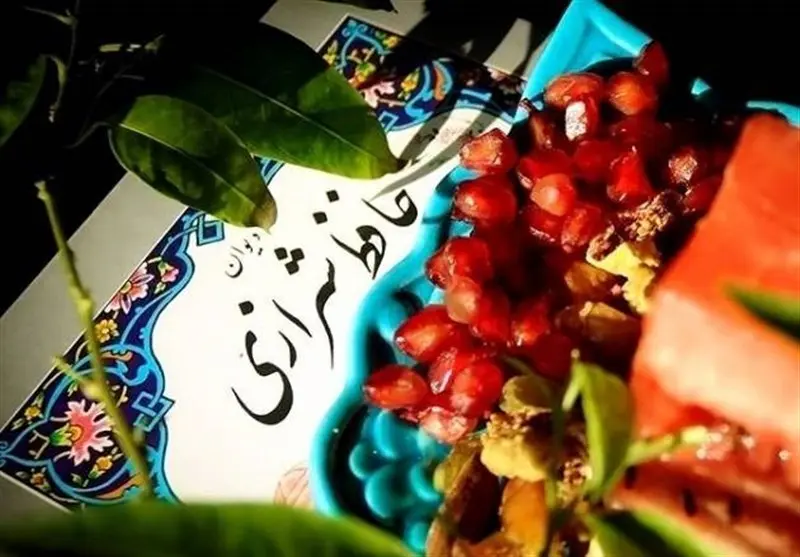
Photo source: tasnimnews.com. Creator: artificial intelligence
Yalda foods in Bushehr include nuts, watermelons, turnips and seasonal fruits such as pomegranates and tangerines. Local dishes such as fish roe, shrimp roe, shekar plou and shvidplou also decorate the tables. People spend this night happily and cordially with their loved ones by wearing new clothes and eating local sweets such as ranging, muscat halva and pashmak.
Qazvin
Yalda night in Qazvin is associated with interesting beliefs. Qazvinis believe that if it rains on this night, Nene Sarma has cried, and if it snows, Nene Sarma will throw out her quilt cotton, and in case of hail, Nene Sarma’s pearl necklace will be torn. On this night, the guests are treated with red fruits called “shabchareh” and Kalepache and pomegranate rice. The old people also cooked rice milk.
In the villages of Qazvin, Shab Cheleh is celebrated with customs such as “Shawl Tanzi” and “Kersiseri”. In the shawl ceremony, if a young boy has chosen a girl, he hangs his shawl from the ceiling of the girl’s house, and if the girl’s family approves, gifts such as socks, peas, and raisins are tied to the shawl. In the Kersi-Seri custom, the boy’s family prepares a procession for his fiancée decorated with gifts such as clothes, sugar bowls, fruits and nuts and takes them to the bride’s house.
Zanjan
The people of Zanjan start the Yalda night by opening a symbolic table that represents the earth. Watermelon and pomegranate are the main fruits of this evening. Yellow watermelon indicates the marriage of a boy and red watermelon indicates the marriage of a girl or the gender of babies. Among the interesting rituals of this night are the distribution of pomegranate seeds among children and the baking of symbolic bread that was thrown far away to spread blessings in the city or village.
The people of Zanjan make “Qowot” or “Quto” and halva on the night of Yalda and spread it in seven mosques with the intention of increasing fertility and childbirth, and they believe that Prophet Khizr eats them at night.
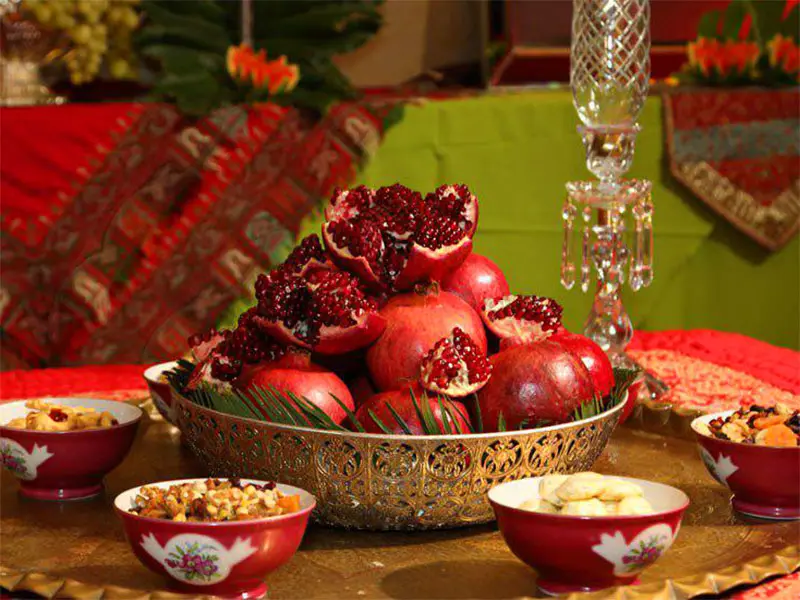
Photo source: irandoostan.com. Photographer: Unknown
If you have interesting information about Yalda night customs in your city and country, we will be happy to share it with the audience.
Cover photo source: chtn.ir site. Creator: artificial intelligence
Frequently asked questions
What are the customs of Yalda night in different cultures of Iran?
Some of the customs of Yalda night in different cultures of Iran include watermelon eating ceremony, Khader Nabi ceremony, flower or pooch game, needle divination, chelesh ceremony, clapping ceremony, gurva game, cloak divination, spoon weaving, shawl laying, elder story telling, kersi series. And there are heads and…
What are the foods of different cultures for Yalda night?
Yalda night foods in different cultures of Iran include various items such as Khashil, Aukonus, Korka, Kasmak, Tehrani Pomegranate Ash, Shelle Kalamkar Ash, Shire Wheat, Klumpeh, Kamach, Shuli Ash, Techin Spinach, Fasanjan, Regag, Fish Roe, Jezlaq, Bezhi becomes tall, stubborn and strong.
RCO NEWS




